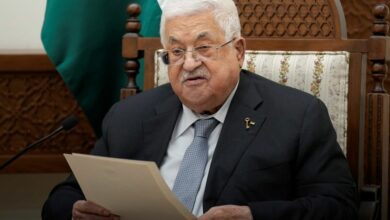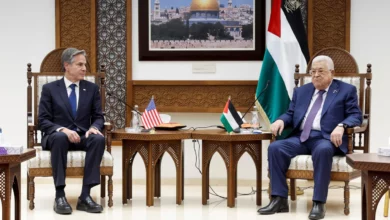Palestinian Prime Minister Salam Fayyad has resigned, ending months of rising tension with Palestinian President Mahmoud Abbas, despite US efforts to keep him in place.
The resignation of the US-educated economist, who won broad international acclaim for his state-building efforts since becoming premier in 2007, comes just days after Washington made a fresh push to revive long-dormant peace talks.
Rumors that Fayyad would either resign or be told to step down by Abbas have been rife in recent weeks after long-standing differences between the two came to a head over the finance portfolio.
Abbas accepted Fayyad's resignation at a brief meeting at the Muqataa presidential compound in Ramallah, but officials said he had asked the 61-year-old to stay on in a caretaker role until a new premier can be appointed.
Fayyad, a political independent, had come under increasing criticism as the Palestinian Authority lives through its worst-ever financial crisis, with Abbas' ruling Fatah movement openly deriding his economic policies as "confused."
But Washington has lobbied hard for the former World Bank official to be kept on, with US Secretary of State John Kerry phoning Abbas late Friday to urge him to find common ground with his prime minister, Palestinian officials said.
Following Saturday's developments, Washington hailed "the important roles played by both President Abbas and Prime Minister Fayyad" in the push toward a Palestinian state, National Security Council spokesperson Caitlin Hayden said.
"Prime Minister Fayyad has been a strong partner to the international community and a leader in promoting economic growth, state-building and security for the Palestinian people," Hayden said.
Long-running tensions between Fayyad and Abbas came to a head six weeks ago over the resignation of Finance Minister Nabil Qassis, with Fayyad accepting it while Abbas did not.
Fayyad himself was finance minister for five years from 2002, and after being appointed premier in 2007, he continued to hold both portfolios until Qassis took over in May 2012.
He was deeply unpopular with Fatah, with a top official from the party's Revolutionary Council expressing relief Sunday at his departure.
"Fatah is relieved over Fayyad's timely resignation which was inevitable," said secretary general Amin Maqbul.
"Fayyad's government failed miserably in steering through the economic crisis and put the PA (Palestinian Authority) in a lot of debt," he said.
Commentators said the problem stemmed from the fact that Fayyad did not belong to Abbas's Fatah.
"There has been a contradiction between it being Fayyad's government and Abbas' government," said Abdel Majid Sweilam, a political scientist from Al-Quds University.
"Fatah is the one that has been standing against the government, its programme and its head," he said, indicating that the party reached a position where it "did not accept his policies any more or even him as a person."
Abbas's PA is in the grip of its worst-ever financial crisis, due to a shortfall in promised foreign aid and Israel's withholding of tax monies for several months, although that decision was recently reversed.
But Fayyad was widely respected internationally for his efforts to fight corruption and build a sound institutional framework for the PA.
Although Israel made no official comment on Fayyad's resignation, Haaretz said senior political figures "expressed much regret" over what the left-leaning newspaper described as "a dramatic development."
"Its ramifications won't just reverberate in the part of the West Bank under Palestinian control, but will also affect Israel and the Obama administration's efforts to renew the peace process, as well as the European Union's policy towards the Palestinians," wrote Barak Ravid.
Fayyad's departure would probably impact on foreign aid donations as well as moves announced last week by Kerry to revive the West Bank economy and remove barriers to growth, he said.
"Without Fayyad guarding the public coffers, it's not certain that the countries currently providing the Palestinian Authority with aid will continue to do so. Israel will also hesitate to promote economic measures in the West Bank with Fayyad away from the steering wheel," he wrote.
While Israel was not connected to his departure, the government's "ambivalent" attitude towards him did not help, he said.
"The policy of (Prime Minister Benjamin) Netanyahu's government certainly didn't help Fayyad's survival on the job."




